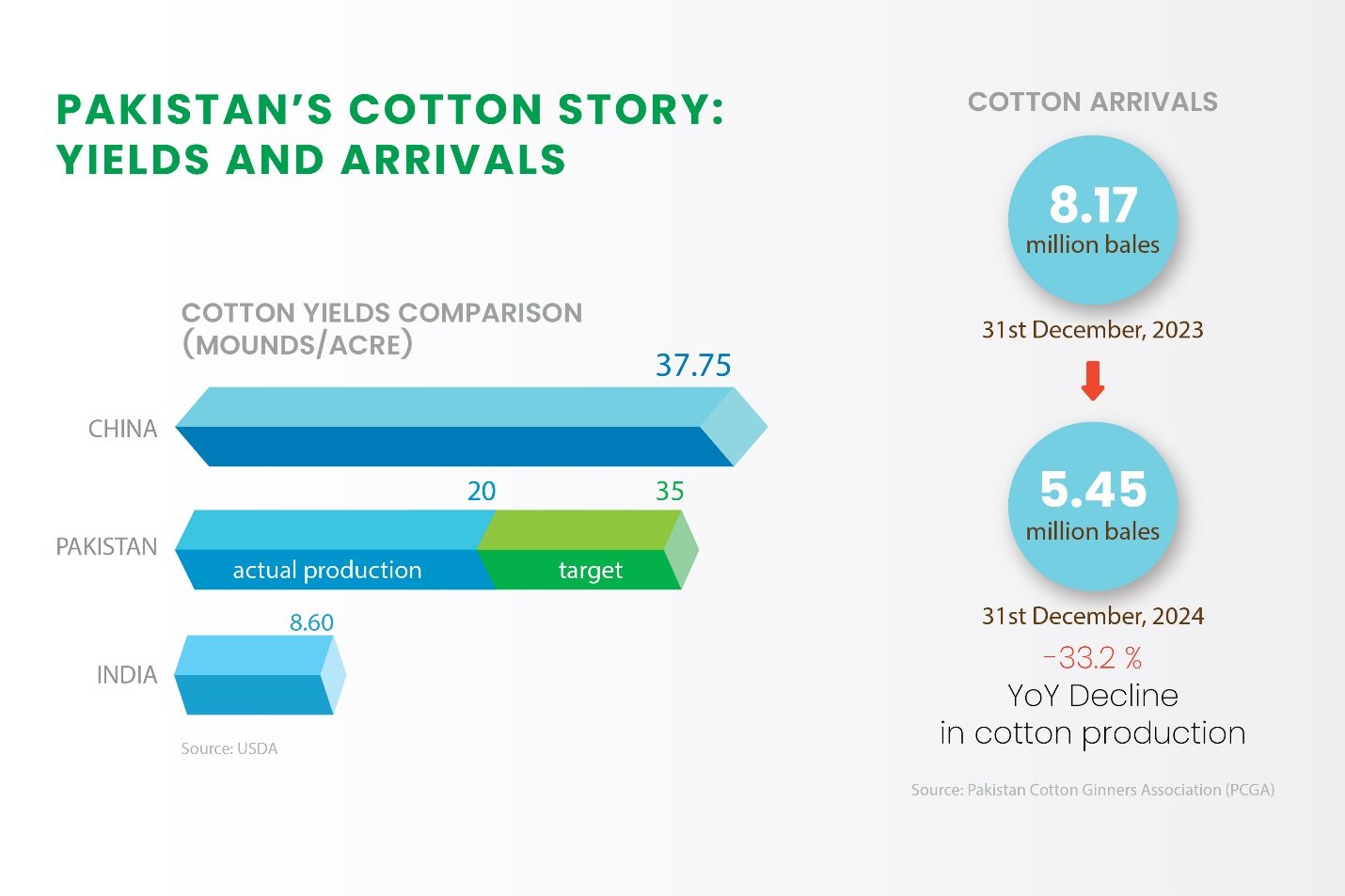In Pakistan’s agricultural landscape, cotton stands as the cornerstone of the economy, earning its nickname “white gold” for its crucial role in driving exports and supporting millions of livelihoods. The introduction of genetically modified (GMO) cotton – crops whose DNA has been scientifically altered to introduce beneficial traits like pest resistance – particularly Bt cotton, has marked a significant turning point in Pakistan’s agricultural history, offering both promising successes and important lessons for future development.
The Bt Cotton Revolution in Pakistan
Since its introduction in 2002, Bt (Bacillus thuringienesis) cotton has revolutionized Pakistan’s cotton sector, now covering more than 90% of cotton fields. The National Institute for Biotechnology and Genetic Engineering (NIBGE) in Faisalabad pioneered this transformation by initiating Bt cotton development programs in 2003. Today, Pakistan ranks among the top 10 nations in developing GM crops globally, with approximately 725,000 cotton farmers cultivating insect-resistant (IR) cotton varieties.
The development and adoption of GM cotton in Pakistan has been driven by critical environmental challenges:
- Salinity affects around 5.33 million hectares of agricultural land, with about 0.04 million hectares becoming saline annually
- Drought impacts 15 million hectares, because of this Pakistan is incurring $20 million dollar per annum
- Waterlogging affects 1.5 million hectares and reduces crop yields by 40-60%
- Insect infestations cause losses of up to 28% in cotton
- Climate change threatens to reduce arable land by up to 50%
Research organizations like CEMB Lahore and NIBGE Faisalabad have responded by developing advanced transgenic lines expressing multiple protective genes. Modern varieties combine pest resistance (cry1Ac, cry2Ab genes) with herbicide tolerance (cp4-epsps gene). Notable examples like CKC-3 and Hatf-3 with the Cry1Ac+Cry2A+GTG gene combination show particular promise for addressing these challenges while improving yields.
Measuring Success and Challenges
The impact of Bt cotton in Pakistan presents a complex picture of both achievements and ongoing challenges:
Successes
- Significant reduction in pesticide costs for farmers
- Enhanced pest resistance, particularly against bollworm infestations
- Successful adaptation, especially in cotton-wheat rotation zones
- Wide-scale adoption by farmers, indicating strong acceptance of the technology
Current Limitations
- Current yields averaging 20 mounds/acre fall short of the national target of 35 mounds/acre.
- Production volatility remains a concern, as evidenced by recent fluctuations (Figure 1)
Figure 1 Cotton arrivals have decreased by 33% to reach 5.45 million bales as of 31st December 2024

- Yield gap compared to other major cotton-producing nations (Pakistan’s yield sits below China’s 37.75 mounds/acre)
- Cotton yields in Pakistan are low due to multiple challenges: inefficient water management, poor soil health, persistent pest problems, technological limitations, and climate change impacts. These interconnected factors prevent farmers from achieving the national target, resulting in yields falling short of the expected 35 mounds per acre.
GMO: Concerns and Solutions
GMOs have not able to gain the desired acceptance in Pakistan as critics raise significant concerns about GMOs, including increased herbicide usage, potential allergic reactions, and environmental impacts like reduced monarch butterfly caterpillar populations. The risk of herbicide-resistant weeds through crossbreeding and corporate control over seed production are additional worries that have limited GMO acceptance.
However, certain GMOs can be safely commercialized with clear benefits. For instance, Bt cotton has significantly reduced pesticide use while protecting crops from pest damage, making the harvest safer for human consumption. This demonstrates how GMO technology, when properly tested and implemented, can address agricultural challenges while minimizing environmental and health risks. The key lies in thorough safety testing, strong regulatory frameworks, and transparent policies that balance innovation with safety concerns.
Economic Impact of GMOs
The economic implications of GMO cotton adoption in Pakistan are substantial:
- Each additional million bales of cotton production creates one million new jobs
- Every million bales generates an extra $1 billion in exports
- The cotton-based textile sector accounts for 60% of total exports
- Cotton contributes 0.9% to Pakistan’s GDP and 2.9% to agricultural value addition
Future Directions for GMO Cotton Development
To maximize the potential of GMO cotton in Pakistan, several strategic initiatives are necessary:
Research and Development
- Development of new GMO varieties specifically adapted to Pakistan’s diverse agricultural conditions
- Focus on creating varieties with enhanced drought tolerance and improved fiber quality
- Investment in varieties that can combat evolving pest pressures
- Strengthening seed certification systems and quality control mechanisms
Regional Expansion
Pakistan must strategically expand GMO cotton cultivation into new regions:
- Development of cotton-growing zones in Potohar, Balochistan, and Sindh
- Exploration of Cholistan and Kachi Canal region potential
- Special focus on Balochistan’s districts (Lasbela, Sibbi, Khuzdar, Kharan, Noshki, and Naseerabad) for organic and premium fiber production
Market Infrastructure
- Establishment of regional cotton trading hubs (CTH)
- Development of electronic trading platforms
- Implementation of standardized grading systems
Conclusion
GMO cotton, particularly Bt varieties, has demonstrated its potential to transform Pakistan’s cotton sector. However, realizing the full benefits of this technology requires a comprehensive approach that combines technological innovation with proper support systems and policies. As Pakistan continues to develop its cotton industry, the strategic enhancement of GMO cotton capabilities will play a crucial role in achieving national agricultural and economic objectives.
The success of GMO cotton in Pakistan isn’t just about adopting new technology – it’s about creating a sustainable and profitable future for millions of farmers while strengthening the nation’s position in global textile markets. With continued investment, research, and proper support systems, GMO cotton can help Pakistan achieve its agricultural potential and secure its position as a leading cotton producer on the global stage.

